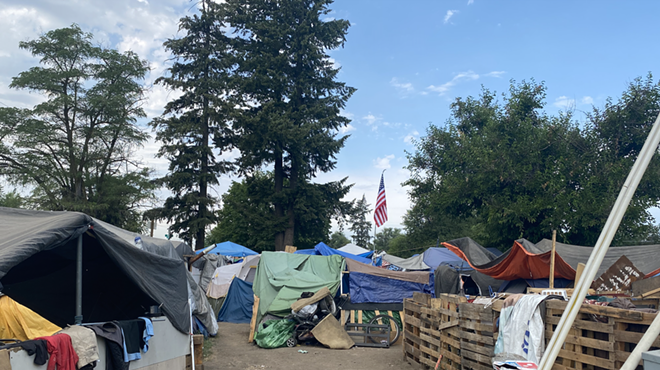
In a lengthy, fiery letter, the Washington State Department of Transportation "strenuously objected" to the city's threats of legal action over Camp Hope, calling Spokane's actions "unlawful," "constitutionally suspect," and "unreasonable and unrealistic."
Earlier today, city spokesperson Brian Coddington said the city was in regular meetings with the state as the parties try to work towards a solution. The meetings are behind closed doors, so we don't know whats going on in there, but the letter doesn't paint a pretty picture.
“Following the protesters’ trespass onto WSDOT property, the agency sought to work with the City to coordinate an effort to humanely remove those individuals from the property. Indeed, WSDOT immediately contacted the Spokane Police Department and Code Enforcement to attempt to coordinate a plan to close off the property. The Spokane Police Department and Code Enforcement, however, advised WSDOT they were directed to not respond to trespass calls involving WSDOT’s property or its surrounding parcels.”
"WSDOT continues its efforts to coordinate with the City, which recently finally agreed to a 'Memorandum of Understanding Between City and Washington State Department of Transportation,' acknowledging the City’s law enforcement’s authority to 'enter, issue no trespass orders, and to enforce state and municipal law' at Camp Hope. In addition, the City finally professed to agree to 'cooperate in efforts to address homeless encampments' and 'utilize its social services outreach resources to connect at-risk populations with critical housing and social services.' The following day, however, the City issued this purported Notice of Nuisance.'
"Although SMC 10.68.040 mandates a response to Chronic Nuisance Notice, it provides no timelines, process, or standards for consideration of the response. Moreover, the code further provides that after a response is submitted, '[t]he person in charge shall enter into an abatement agreement or otherwise produce a plan approved by the chief of police or his designee to abate the nuisance within fifteen days of the issuance of the chronic nuisance notice'—irrespective of whether the respondent objects to the Chronic Nuisance Notice.
Here, for instance, WSDOT contests the Chronic Nuisance Notice and does not agree with the proposed 'Chronic Nuisance Abatement Agreement' drafted by the Spokane Police Department. But the code provides no mechanism by which respondents can challenge the proposed agreement. Instead, the code purports to require WSDOT to agree to the 'agreement' drafted by the City without any input from WSDOT or meaningful legal process whatsoever, produce a plan approved by the chief of police or his designee (in their sole discretion, apparently), or else be guilty of a class 1 civil infraction. See SMC 10.68.050.B ('It is a class 1 civil infraction for any person in charge to fail to enter into an abatement agreement or otherwise produce an approved plan to abate the nuisance within fifteen days of the issuance of the chronic nuisance notice.'). Requiring a respondent to enter into a contested 'Chronic Nuisance Abatement Agreement' with no means by which to challenge it or else be subject to civil penalties, falls far short of the minimum due process required by our State’s constitution."
"Moreover, the site population is beginning to further decrease as limited shelter beds have become available (although WSDOT disputes that Trent Resource and Assistance Center has capacity for '250 minimum with additional flex space to 400,' as you assert at page 4 of the Notice)."
"The City’s Notice appears to quantify potentially available shelter beds, but WSDOT’s understanding is that a significant number of those beds are not currently available. Clarity and confirmation surrounding how many beds and where those beds are available is key to solving this complex issue — a discussion that should have taken place long ago but for the City’s resistance to coordinating efforts."
"Moreover, your failure to work effectively with the State when Camp Hope was first established, and contained less than 100 residents, led to its growth and the conditions that you complain of now. Because the City both caused and contributed to the conditions at Camp Hope through its own actions and inactions, its attempts to shift blame to the State must fail."
"The City's counterproductive approach of seeking to shift blame onto WSDOT rather than working collaboratively ignores not only the complex challenges at Camp Hope but is also constitutionally suspect. Moreover, the City's approach and artificial deadlines will not benefit the people living within or outside of the encampment and will very likely continue the cycle of displacement and encampments within City limits on the eve of the holiday season."
You can read the full letter below:


























